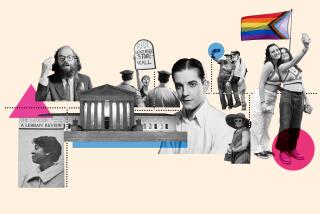Group Helps Muslim Gays
- Share via
NEW YORK — If Sadiq’s father knew that his 19-year-old son was gay, he would kill his son and then himself, says Sadiq, a quiet, neatly dressed Palestinian who attends college in the northeast United States.
Being gay in the United States has never been easy. But being gay and Muslim, especially after Sept. 11, 2001, requires homosexuals to defend their religious identity in the face of an increasingly suspicious U.S. government and their sexual orientation amid hostility from the conservative Islamic community.
Many would rather deny their sexuality than sacrifice family, friends, culture or religion by coming out of the closet.
But some gay, lesbian, bisexual and transgender Muslims are finding a safe haven in Al-Fatiha, a Washington, D.C.-based group that was founded in 1998 to support those who want to reconcile their sexual orientation with Islam.
“I am a practicing Muslim,” said Sadiq, who did not want to disclose his last name. “I don’t want to choose between my culture, my family and being gay. That is why Al-Fatiha is helping with the religious and spiritual aspect of it.”
Sadiq, like many Muslims who are not ready to tell the world they are gay, said he has nonetheless come a long way. “Now I am able to come to terms with myself,” Sadiq said, attending his first Al-Fatiha meeting this month.
According to Islam as he understood it before his contact with Al-Fatiha, he said, God is against homosexuality and it is unnatural, so “I thought it was a mental illness.”
Being able to speak for the first time about being gay and Muslim -- with the first openly gay imam -- was a relief, he said.
Imam Daayiee Abdullah, who is based in Washington and is one of three Muslim religious leaders worldwide known to be openly gay, spoke recently to about 70 Muslims in Al-Fatiha about a more liberal interpretation of their religion.
No matter who you are, the most important rule in Islam is to worship God, he told them. “While imams segregate those who aren’t like them ... I want to help the community,” he said. “God accepts everyone.”
Religious scholars said Islam’s prohibition of homosexuality rests on the story of Lut in the Koran, also known as Lot in the Bible. According to some interpretations, God destroyed the city of Sodom after residents demanded that Lut turn visiting men over so they could have sex with the strangers.
Abdullah disagrees with that interpretation. But for traditional religious leaders such as Imam Omar Abu Namous of the Islamic Cultural Center in New York, homosexuality is condemned by God.
“The Koran is against any homosexual relationship. It says that God is against male with male relationships, as well as woman with woman,” Abu Namous said.
Although court rulings, media coverage and religious institutions have brought homosexuality further into the mainstream in America, many gay Muslims remain fearful.
There are many more homosexual Muslims in the United States than the 700 members of Al-Fatiha.
Many gay Muslims do not get involved because they can’t deal with their sexuality, said group founder Faisal Alam, a 26-year-old of Pakistani descent who lives in Washington.
The group has chapters in New York, Atlanta, Los Angeles, San Francisco, San Diego and Washington and affiliates in all major cities in Canada.
Most of its members, who are primarily male, were born abroad, in Middle Eastern or Asian countries.
“Before Sept. 11, I had to defend myself being gay, but since then I have had to defend being Muslim as well,” a member of Al-Fatiha said. “If I was strong before, I am stronger now.”
More to Read
Sign up for Essential California
The most important California stories and recommendations in your inbox every morning.
You may occasionally receive promotional content from the Los Angeles Times.










